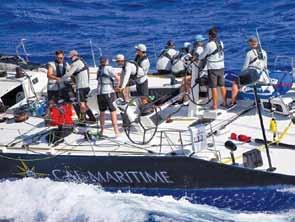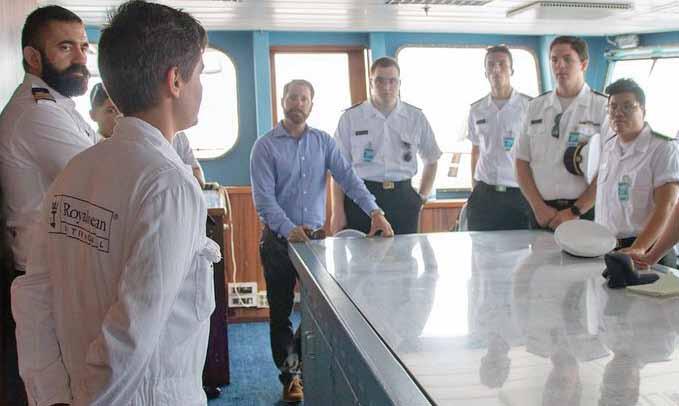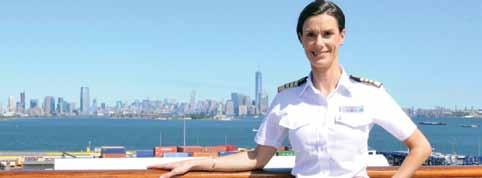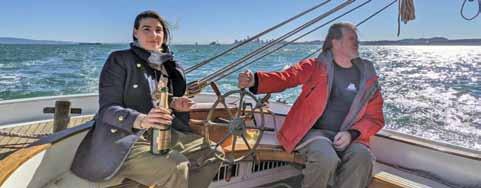
13 minute read
put sailing on your résumé
For the serious sailor, a maritime Freda B. "We had 12 people working for career can represent the intersection us in 2019. We have four left. We haven't of hobby, passion and calling. More had regular shifts in over a year. People than "simply messing about in boats," are doing what it takes to stay in the inmariners have carved niches in every- dustry. So yeah, 2020 sucked." thing from deckhanding to captaining, With what we're now confi dent to call minor boat work to a light at the end of master carpentry, and retail work to "Even though we're a very the tunnel, sailors should be returning international lo- small segment of the to their jobs — evengistics. Even journalists can fi nd a industry, the industry values tually. Exactly how long it will take for way to write about people who have worked on the aforementioned boats and sailors. The effects of charter boats." industries to recover is unclear, but the pandemic on the there's little doubt maritime sector have been as varied and that careers in the maritime trades will diverse as the industry itself. Sailing is continue to proliferate. booming, according to everyone. Boat Academia has also seen a pandemicsales are through the roof, mechanics related slump in demand, though the and riggers are booked solid, survey- California Maritime Academy in Vallejo ors are surveying, and boatyards are has managed to safely continue on- humming. Conversely, the cruise ship in- campus learning. As students with dustry has seen a "devastating impact," 'traditional' degrees graduate with stagwith the loss of over 250,000 American gering debt and uncertain job prospects, jobs, and some $32 billion in economic maritime careers might look more and activity. Ferry ridership has dwindled. more attractive. What's more, the United Although international shipping saw an States is facing what Forbes called an initial pandemic-induced slump, which "unprecedented skilled-labor shortage," had a lasting ripple effect on ports, truck- a sentiment that's been echoed by boating and other cogs in the supply chain, yards for the past several years. The shipping is recovering — even booming. lack of skilled labor is inextricably tied The charter-boat industry — which to infrastructure as a whole. As part we'd normally be highlighting in the April of the American Rescue Plan — also issue of Latitude — has had an especially known as the $1.9 trillion COVID-19 rough year. "The small passenger-vessel stimulus package — the Biden adminisfl eets across the country have been hit as tration hopes to expand apprenticeship hard as bars and restaurants," said Paul initiatives for trade unions. A new pilot Dines, the captain and co-owner of the program at Spaulding Marine Center in 80-ft gaff-rigged topsail coastal schooner Sausalito, which aims to train people in

Spaulding Marine Center will soon be hosting "Boatworks 101," an apprenticeship program that aims to train young people in a range of marine trades.





SPAULDING MARINE CENTER

a wide variety of marine trades, might be eligible for funds. As the crew of the Freda B plans to get back to work soon, the boat will continue to serve as a training platform for mariners. "Even though we're a very small segment of the industry, the industry values people who have worked on charter boats, because they possess a breadth of skills and experience," Dines told us. We fi rst met Paul in April 2017. It was Opening Day, and Freda B was among the dozens of boats parading down the Cityfront. We relaxed our (not-so-stringent) journalistic ethics and enjoyed the amazing food, ice-cold beverages, and all-around hospitality on offer by Freda B's crew, and we got to know the tall, lanky, affable Dines a little. "My fi rst job was on a fi shing boat; I was a third mate. I worked my way up to second mate, navigator, and fi nally took my captain's papers when I was 30," Paul said. He grew up on Hilton Head Island in South Carolina, and would eventually apprentice under such notable Bay Area sailors as Commodore Tompkins, Billy Martinelli and Al Lutz. "In that era, there were a lot of race series and offshore racing up and down the coast. I





CAL MARITIME ACADEMY FREDA B
PAUL DINES / FREDA B
Clockwise from top left: The California Maritime Academy races in the 2019 Transpac aboard an Andrews 77; the 'Freda B' takes charter guests for a spin on the Bay; Captain Liza Dean at the wheel on 'Freda B'; hands-on training aboard one of the California Maritime vessels; Spaulding Marine Center is launching a marine trades apprenticeship program in September.
really enjoyed deliveries because it was contract work. I was well seasoned at 30." Dines spent some time studying at Cal Maritime for his captain's license (but was not a full-fl edged 'cadet'), a process he called "pretty [darn] brutal." Paul is also commodore of the Master Mariners Benevolent Association, and is an important leader and organizer in Sausalito's working waterfront community. "So much of our profession you can learn in an academic environment, but there's a large role for the oral tradition," Paul said. "In our industry, it's the rule of exception. It's always different, it's very dynamic, such as how to read wind and waves and currents, and how to learn leadership. And you still need sea time." Dines reminded us that to be a captain, mariners need two years of practical experience, or sea time. "It's every bit as diffi cult as getting a master's degree," Paul said. "It's 720 days. It's a lot. "Given my background, I'm kind of a pain in the ass," Dines told us. "I want people to demonstrate excellence. I'm willing to feed into that." Dines said that he encourages his crew to acquire extra licenses through maritime academies, and "to do everything to make themselves a professional who's respected by their peers. It's part of a management philosophy where we recognize people who are motivated and bring their A game, which ties into their longer-term goals." Paul said that he's happy to pay for classes and credentials, because it gives him a depth of organization. "We are all enjoying their success, and it's motivating for everyone else. For people who have an ambition and want a solid job, there's a ladder for them to climb in our organization. We've had multiple women who started as deckhands who ended up captains. We've had people who go on to work for the Bar Pilots or NOAA, or on other schooners or charter boats. A lot of them own their own small boats. These are really good bluecollar jobs, and they matter." Dines confi rmed that many new sailors lack a "depth" of knowledge. "Being captain is not just like driving a bus," Paul quipped. The breadth of familiarity with various boat systems, navigational rules and judgment forged through experience requires time and training. "I'm thrilled that Bill [Edinger, the president of Spaulding Marine Center] is going to create the apprenticeship academy, to offer that depth and help support that career track." Edinger told us that he's received strong support from the maritime community for Spaulding's pilot apprenticeship program, known as Boatworks 101, which is set to start as a six-person
The 'Freda B' serves as a platform for sailors climbing the maritime ladder.






That's Cal Maritime alum Kate McCue, who was the fi rst-ever American woman to captain a 'mega' cruise ship, the 964-ft 'Celebrity Summit'.
program in September. Bill said that where most apprenticeship programs are trade-specifi c, Spaulding's program will cover a wide variety of skills. "A marine-service person needs to be a jack of all trades. Apprentices are going to get exposed to electrical, engines, carpentry, hull materials and fiberglass composites. And these skill sets transfer to different jobs. People who have been through the program could go on to get a job in cabinetmaking, plumbing, or another trade. We don't think there's any shortage of need," Edinger said of the nationwide demand for skilled labor. Spaulding said that unlike most industries in California, recreational marine services have no organized association that supports the recruitment, training, and apprenticeship programs for future employees. Spaulding also said Boatworks 101 will be very hands on, and that they have an active yard to keep people in the program busy. Apprentices will work at Spaulding for nine months, then do six months of rotations at partner organizations, which include KKMI, List Marine Inc., South Beach Riggers and Berkeley Marine Center. When considering his personal path to a maritime career, Edinger said he tells people that where some kids grew up wanting to be a fi reman, he grew up wanting to be around boats. "I think my fi rst job I worked for Svendsen's; I worked in the marine-retail business for a number of years, and worked for a service company. I eventually bought that little company, which became Edinger Marine." Bill went on to found Spectra Watermakers. Edinger, who owns the Cross 45 trimaran Defi ance, said that 40 years ago, the perception was that if you wanted to get ahead, you had to go to college. "A lot of people came out of college with some sort of education, but huge debt. I think the pendulum is swinging, and it's the right time for it to swing. People are aging out of the trades, there's a huge shortage of workers, and you can make a good living." Edinger emphasized that Boatworks 101 is not a school, but rather, a paid apprenticeship. "There will be no fi nancial barriers to entry; we think we'll get a lot of young people. We're hoping that proof of concept will help with future funding," Edinger said.
In a press release, the Biden administration said that registered apprenticeships have been a reliable pathway to the middle class for decades, and cited a study showing that workers can earn $240,000 more over the course of their lifetime by participating in apprenticeship programs. "Registered apprenticeships are especially important as we recover from the pandemic, allowing workers who have lost their jobs or young people who are entering a weak job market to train for the jobs of the future while earning a decent income," the release said. Let's not discount academia altogether, though. We would be remiss to do a story about maritime trades in the Bay Area and not talk about the California Maritime Academy, which has been educating mariners for nearly a century. Today, about 1,000 students attend the Vallejo campus. Majors include marine transportation, mechanical engineering, international business and logistics and global studies and maritime affi ars. "There's a number of different options in terms of career paths," said Donald Maier, the dean of maritime transportation, logistics, and management at Cal Maritime, which is a four-year college that's part of the California State University system. "The majority of graduates go to sea as part of a licensed program; others take a number of positions in supply-side logistics." There's a bit of wisdom that says those who go to sea only do so for a limited time. "Typically, graduates get the license, ship out, and sail for fi ve to seven years. Then they say, 'I've seen the world three times, and I miss my wife or husband.' A lot of 'shoreside deckies' take an offi ce position with a shipping company, or with terminal operators or stevedores. Some go on to marine surveying. Some will get an MBA and start a business, or become attorneys in admiralty law. But a majority of them will take a position in the maritime industry, and our alums
That's Cal Maritime Academy alum Piet van Os (center-ish; blue shirt), meeting with cadets on board a Royal Caribbean ship in 2019, when the CMA's training ship 'Golden Bear' was in Miami. "I wanted to inform the cadets that there were good jobs available on cruise ships, and that they didn't only have to sail on US-fl ag ships," van Os told us. "With the way the industry was growing, pre-COVID, it was a good place to be — and it will, again, be a good place!"
CAL MARITIME ACADEMY
have one of the highest earning potentials out of university graduates here in the state." In a ranking by Forbes of public colleges in the US with the highest-earning graduates, Cal Maritime placed 20th. (SUNY Maritime College in the Bronx ranked first on that list; the United States Merchant Marine Academy in Kings Point, Long Island, ranked third.) The US Department of Education's college scorecard ranked Cal Maritime "the number one public university in the state for alumni earnings 10 years after enrollment." Maier said that students typically graduate with some debt, but have much more direct career paths than other university students to manage that debt. "When we recruit at high schools, we tell students that as you're walking across the stage to graduate at Cal Maritime, you'll already have a job, or will within three months of graduating. The students that come here are much more focused on what their end goal is. There's a lot of opportunity for them." — tim henry


ANDREW BIERNIER
That's Captain Jay Grant, right, and Thanie Pesavento sailing aboard 'Freda', the Bay Area's oldest boat, in late January. (It was Jay's birthday.) Jay told us he's managed to stay busy through the pandemic, transitioning from captain of the schooner 'Seaward' to director of education at Spaulding. "I've been in and around boating since I was very young. I considered other careers, went to junior college for a couple years for architecture, and went into other businesses that weren't boating related. But boating was always in our family. I got my captain's license in the mid-'80s, and worked in Europe, the Caribbean, on the East and West Coasts, and all over in Australia."
As mentioned, this story would normally be a listing of charter companies, which can be found on our website at www.latitude38.com. (Click on "Resources" at the top of the home page, then scroll down to "Guide to Bay Area Sailing Charter Companies.")
Freda B will start their public sailing schedule on April 1. "We are offering physically distanced, sunset sails on Thursdays and Fridays, Sunday morning marine-wildlife sails under the Golden Gate Bridge, full-moon sails offered monthly, and more," said Marina O'Neill, Freda B's event manager. "We do have an awesome sail scheduled to the Farallone Islands for Earth Day, as well." For more information, please go to www.schoonerfredab.com, or call (415) 331-0444.
DON’T LEAVE THE DOCK WITHOUT US

Breakdowns can feel unnerving but with an Unlimited Towing Membership, there’s no need to worry. With 600+ boats and 300+ ports on the water, help is just a phone call away.

UNLIMITED TOWING MEMBERSHIP $165*





